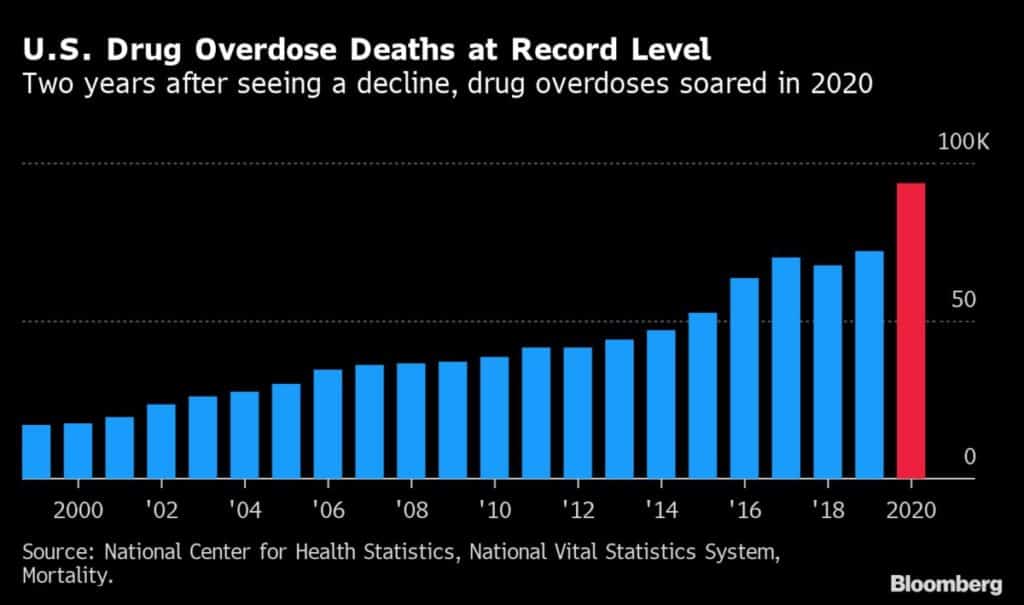The Overdose Epidemic – 2020 Stats & The Effect Of Covid
Drug addiction has many unfortunate short-term and long-term effects. Some short-term effects are changes in appetite, sleeplessness or insomnia, increased heart rate, slurred speech, changes in cognitive ability, and loss of coordination. Once someone has been in the perils of drug addiction for a while, they start to experience the long-term effects of drug addiction. These can include psychological effects, such as depression, anxiety, panic disorders, increased aggression, paranoia, hallucinations, as well as physical problems, like cardiovascular disease, respiratory problems, kidney damage, and liver disease. The most damaging effect of drug addiction, and the one that has the highest chance of death, is an overdose.
An overdose can happen to any type of drug user, old or new, experienced, or inexperienced, and does the same type of damage. Currently, the United States is in an overdose epidemic. According to the National Institute on Drug Abuse (NIAA), In 2019, nearly 50,000 people in the United States died from opioid-involved overdoses. The misuse of and addiction to opioids—including prescription pain relievers, heroin, and synthetic opioids such as fentanyl—is a serious national crisis that affects public health as well as social and economic welfare. The Centers for Disease Control and Prevention estimates that the total “economic burden” of prescription opioid misuse alone in the United States is $78.5 billion a year.” (1) Now, with the current climate of covid running rampant, people are turning to drugs as a way to escape isolation and deal with the uncertainty of the future of our nation, leading to a slew of overdoses during Covid. But what are the exact overdose stats in 2020, where Covid restrictions were more in place, what are the dangers of falling into overdoses during Covid, and just how bad is the overdose epidemic?

What Is An Overdose?
The term “overdose” is a term we hear often, especially nowadays when the country is in the depths of an opioid overdose epidemic. But what exactly is an overdose? According to the American Addiction Center (AAC), “an overdose represents a pathologic level of drug toxicity—at such a magnitude that it overwhelms normal physiological functioning.” (2) Essentially, an overdose happens when too much of a drug has been taken, usually in a short amount of time, to the point that it causes the taker to experience a multitude of different reactions, or just one, in some cases. The AAC goes on to describe the general symptoms of an overdose as severe chest pain, seizures, severe headaches, difficulty breathing, delirium, extreme agitation, or anxiety.
They also name deviations from normal body temperature (e.g. hyperthermia/hypothermia), passing out or an unresponsive loss of consciousness, skin color changes (e.g., pallor or bluish tint to skin if a respiratory depressant was used; ruddy or flushed after cardiovascular overstimulation), abnormal breathing, and fast, slowed, or irregular pulse as other signs that someone is experiencing an overdose. (3) Every drug is different, so it’s not clear how much of a drug can cause an overdose. Some people overdose the first time they take a drug, and others overdose because they take an amount that is more than their usual drug intake. Either way, without proper medical attention, an overdose can be fatal. During a time of high stress, overdoses during covid are on the rise, further escalating the overdose epidemic and ballooning the overdose stats in 2020.
Check Your Insurance Coverage for FREE
Find out if your insurance covers addiction treatment in minutes. We accept most insurance!
Overdose Stats in 2020
The overdose stats in 2020, during an overdose epidemic, are quite alarming. Data collected from the National Center for Health Statistics indicate that there were an estimated 100,306 overdoses during covid in the United States. (4) These overdose stats in 2020 were taken during a 12-month period between the period of April 2020 through April 2021. They go on to state that this is a 28.5% increase from the 78,056 deaths from April 2019- April 2020. (5). Clearly, with that significant rise, we are in the midst of an overdose epidemic. What is the cause of such a spike? Unfortunately, it’s easy to see that the spike is seen in overdoses during covid, a time where people are in a state of panic, depression, and anxiety about what the near future holds.

As a nation we have gone through many scares, such as 9/11, experienced rough patches of economic recession, and worked through environmental decay causing droughts. In all of these unfortunate situations, the one common denominator we had as a people was that we can still congregate, providing each other with warmth and solidarity to get through the rough times. However, this current Covid pandemic is unique in that we are told we need to stay away from each other in order to stop an airborne virus. We have been forced into lockdown, unable to physically see the ones we love, and asked to not attend social gatherings. Thus, we experience depression, loneliness, and boredom, and that’s a perfect recipe for one to indulge in higher amounts of drugs, which have led to a number of fatal overdoses during Covid. Here are some overdose stats in 2020 to further show how bad the overdose epidemic is:
- More than 96,000 people died of drug overdoses during the first year of the COVID-19 pandemic – that’s an increase of almost 30 percent in just one year, according to the Centers for Disease Control and Prevention. (6)
- Estimated 93,000 people died of drug overdoses in 2020 has renewed attention on the nation’s other epidemic. (7)
- In Maryland, the Opioid Operational Command Center reported that from January to September 2020, deaths related to opioid use increased by 16 percent among non-Hispanic whites and 13 percent among non-Hispanic Blacks — while Latinos saw an increase of 27.3 percent. (8)
These overdose stats in 2020 are a grave reminder that on top of the Covid pandemic, there is another deadly epidemic happening in our nation. If you or a loved one ever experience a drug overdose, it’s important to call 911 immediately. Proper and quick medical attention can be the difference between life and death.
Reach out to Hotel California by the Sea
We specialize in treating addiction and other co-occurring disorders, such as PTSD. Our Admissions specialists are available to walk you through the best options for treating your addiction.
References:
- Opioid Overdose Crisis | National Institute on Drug Abuse (NIDA)
- Drug Overdose Deaths in the U.S. Top 100,000 Annually (cdc.gov)
- Drug Overdose Deaths in the U.S. Top 100,000 Annually (cdc.gov)
- Drug Overdose Deaths in the U.S. Top 100,000 Annually (cdc.gov)
- US Overdose Deaths Surge to an All-Time High | Chicago News | WTTW
- How can the U.S. reduce drug overdose deaths? A wide range of ideas awaits Biden. – The Washington Post
- Latinos grapple with opioid overdose rise as Covid pandemic triggers surge in U.S. addictions (nbcnews.com)
